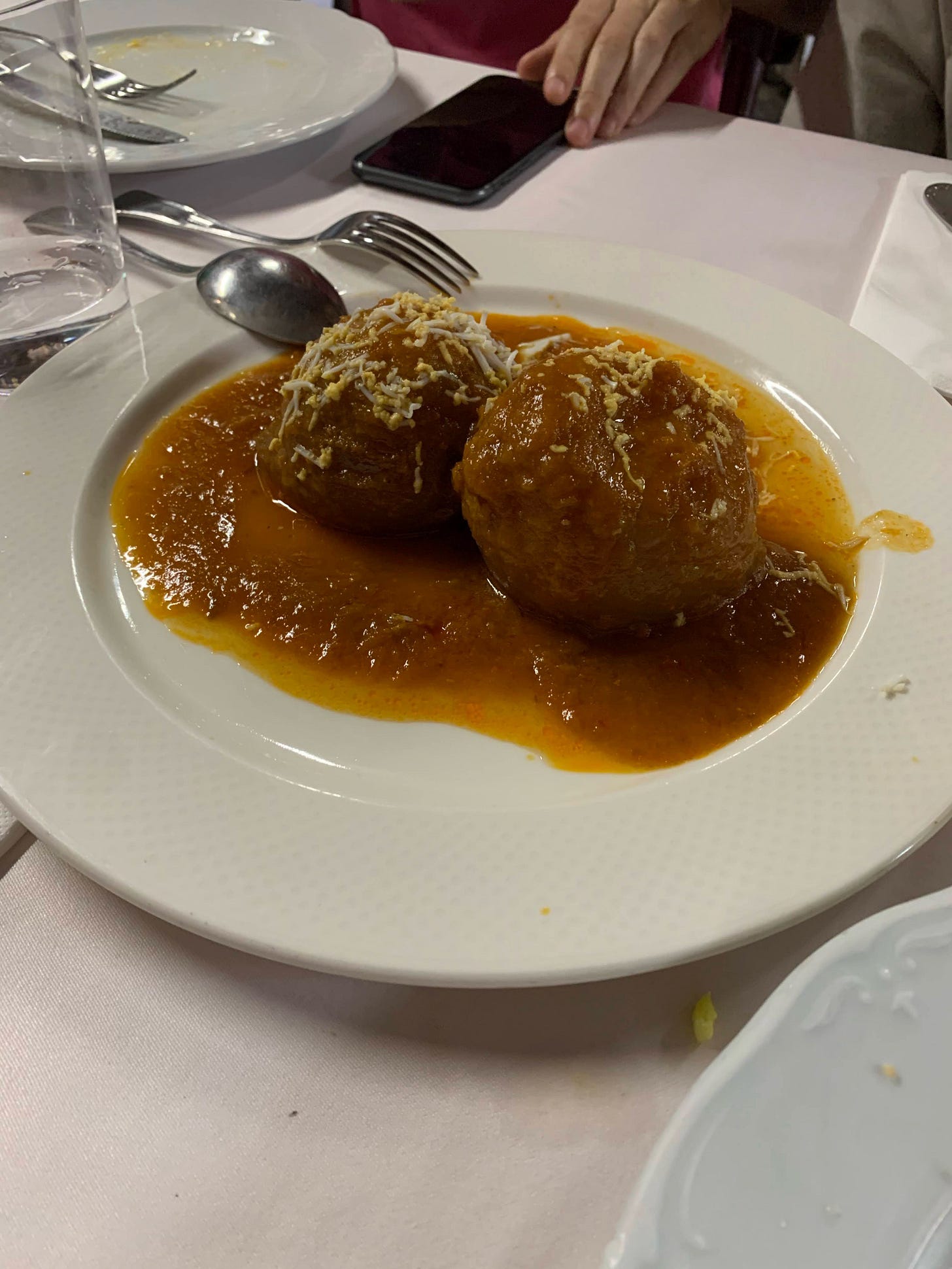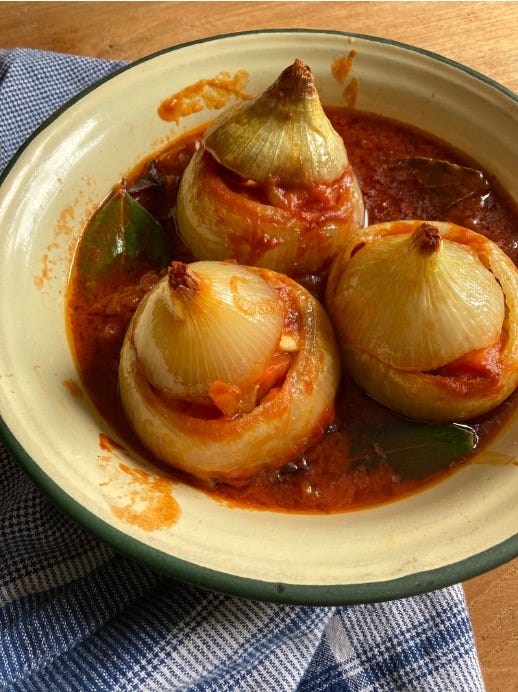If you don’t like it, you know what you can do
An essay on the legacies of a mother’s love in the kitchen. Words and photo by Huw Lemmey. Additional photo by Georgia Rudd.
Good morning and welcome to Vittles. Each Monday we publish a different piece of writing related to food, whether it’s an essay, a dispatch, a polemic, a review, or even poetry. Cooking from Life is a strand of essays that defy idealised versions of cooking – a window into how food and kitchen-life works for different people in different parts of the world; cooking as refusal, heritage, messiness, routine. This week’s Cooking from Life is by Huw Lemmey. You can read our archive of recipes and essays here.
If you wish to receive Vittles Recipes on Wednesday and Vittles Restaurants on Friday for £5 a month, or £45 a year, then please subscribe below – each subscription helps us pay writers fairly and gives you access to our entire back catalogue.
Vittles contributor Jack Thompson worked on the newly released podcast series Fuel to Fork, which exposes the hidden role of fossil fuels in the food we eat, ‘revealing how food accounts for 15% of global fossil fuel use.’ Listen here.
‘If you don’t like it, you know what you can do’
When I read writing about food, even good, compelling writing, a shiver of panic runs across my skin. Writing around food – its social context, infrastructure and immigration, kitchens, class, and restaurants – is fine. But when writing concerns the stuff itself – its taste, texture, and colours on the plate – I can feel my heart rate picking up, a slight sweat on my forehead. And when people talk about glugging wine with their probably gorgeous young friends as they swirl sizzling anchovies in olive oil, the tender, salty flesh breaking apart as easily as their liaisons with probably handsome men … I don’t know, it gives me the ick. Living well, and without shame – it feels deeply suspicious. It goes against everything I was raised to believe in.
I’m only half joking. Like most people, I suspect, I was taught to cook by my mum. Her culinary style was utilitarian to say the least – influenced more by home economics than Nigella, with priority given to meeting the calorific demands of three growing lads and a husband, all while on a limited budget. Dishes like spaghetti bolognese, shepherd’s pie, baked potatoes, and Irish stew with fat dumplings were supplemented by store-cupboard improvisations like ‘eggy-beany-stuff’ – plus her dictionary of maxims that were intended to toughen us up, like spiritual calcium. ‘If you’re hungry, there’s always bread’, ‘If you don’t like it, you know what you can do’, and, ‘Well, life isn’t fair’ were, like cooking, tough lessons that we were only ever going to learn from her.
Life isn’t fair. When I was eleven or twelve, my mum was diagnosed with motor neurone disease (also known as ALS or Lou Gehrig’s disease). This is a neurodegenerative illness of unusual barbarity, slowly robbing sufferers of their movement but often leaving their cognitive functions fully intact. Death is inevitable, and its overture anguishing. Following her diagnosis, Mum’s educational strategy was turbocharged, as she set about teaching me all the base skills I would require to cook and feed myself while she still could. A curriculum of white sauce, perfect roasties, custard from scratch, Victoria sponge, Yorkshire puddings, indeterminate curry, bread, honey-roast ham, and poached eggs raced against a prognosis that we counted in months rather than years. As the illness progressed, my brothers and I took on more of the cooking responsibilities, trying to match our mum’s recipes as closely as possible to provide decent meals.
This was our teenaged attempt to repay care with care, love with love. I may have so far given the impression that my mum was a practitioner of tough love, but that was just a fraction of the types of love she gave – all of it, like her food, unfussy, nourishing, and missed. It was a love of absolute, expansive, and simple solidity, borne of her own socialist, Quaker, and Methodist upbringing. At the top of the stairs in our house there was a framed list of even more maxims, titled ‘RULES TO BE FOLLOWED BY THIS FAMILY’, which had hung in the room where her grandmother had been born. ‘Waste not; want not. Study to be quiet, and to do your own business, and to work with your hands. Never spend money before you have it. Never buy what you don’t want because it is cheap. Never put off till to-morrow what you can do to-day.’ But also: ‘Take all things by the smooth handle. Be obliging and kind to another. Nothing is troublesome that we do willingly.’ She lived by these mottos, which formed a sort of no-nonsense attitude that stood up to bullies, put every thing in its proper place, and spoke kindly but honestly.
When my mum died, a couple of weeks after my seventeenth birthday, I suddenly found myself without my lifelong teacher. In the messy years that followed, trying to make sense of what was left of her in the world, I realised that occasionally you have to unlearn what your parents taught you. I sometimes take pleasure in knowing what advice Mum would have given me and ignoring it. And I feel heavily what she missed out on: not just seeing her grandchildren be born, or sharing in our lives as we grow older, but what she missed out on while alive, when she was teaching me these lessons. I wish she had given us less and taken more for herself. Perhaps my memory is skewed by those terrible last few years, but I wish I had more memories of my mum enjoying food, not just cooking it. I’m not trying to paint her as a martyr – I know she had those moments; I know she laughed and cheersed and savoured with the best of them. I just wish she had had more.
Friends have taught me plenty about how to cook since then. Cracking open crabs on the countertop with Noela for the first time, or baking a turbot stuffed with lemons with Dr Valli, or filleting yellowtail snappers on the back of the boat with Eddie and Frank, are lessons about more than just food. I’ve balanced the stoic Protestant maxims at the top of the stairs with some I’ve figured out on my own: enjoy the cooking as well as the dish; take more than you need of anything that’s joyful; spend your pleasure today and do not save it for tomorrow, which, for you, might not come. In this spirit, here is a recipe I picked up a few years ago in Asturias, on a long weekend with friends, overindulging without consequences from God. I like it and I think my mum would like it too; while it’s hearty and wholesome, it takes time to prepare and feels special to serve. It requires a little fuss at first, but then you can just hang around in your kitchen, chatting. You’ve got to learn to enjoy the glugging wine and the sizzling fat and the beautiful young friends too, without shame.
Stuffed Onions, Asturian Style
Serves 2–3 as part of a lunch with french fries or rice
Time 2 hr 30 mins
Ingredients
4 large onions
2 medium eggs, hard boiled
3 roasted red peppers from a jar
250g Bonito tuna fillets in olive oil (net weight) or good-quality tinned tuna in olive oil
500g passata
salt and pepper
plenty of olive oil
2 garlic cloves, finely chopped
1 bottle of Asturian cider (Trabanco is what I used – it’s dry and flat)
1 bay leaf
1 tbsp plain flour
to serve
french fries or rice
Method
Peel the onions then trim the root, being careful not to cut through the skin – this will allow the onion to sit flat. Slice 1cm off the top and set aside. Use a paring knife and a teaspoon to scoop out the centre, being careful to leave a few layers. Chop what you’ve removed, and put to one side.
Roughly chop the eggs and the roasted red peppers. Put in a mixing bowl along with the tuna and 1 tbsp of its preserving oil. Use a fork to roughly break up the tuna, then add 3–4 tbsp of passata and mix to combine. Season to taste.
Fit the onions as snugly as possible in a small pan or casserole. Pour in enough oil to reach halfway up the onions. Gently fry the onions over a medium heat until they begin to brown but retain some shape. Turn the onions to cook both sides, then remove them from the pan and set aside to cool. Fry the little onion “hats” too until lightly golden and set aside.
Remove all but a few tablespoons of the oil from the pan, then add the chopped onion and the garlic. Sauté for 8–12 mins, until translucent. Add the rest of the passata, a good glug or two of cider, and the bay leaf. Mix the flour with 2 tbsp of cold water to make a paste and then stir that into the sauce too. Bring everything to the boil and give it a good stir, then reduce the heat to low.
When the onions are cool enough to handle, spoon the tuna mixture into them, then put their little hats back on top. Gently lower the stuffed onions into the pan – they should be nearly covered by the sauce. If the onions threaten to sink, remove any excess sauce with a ladle and reserve for later.
Half cover the pan with a lid and cook on a very low heat for 2 hrs. The sauce should cook down and reduce by half, but if it’s looking too dry, add a little of the excess sauce or a splash of cider. Season 1 hr into cooking.
When you’re ready to eat, serve the onions along with spoonfuls of the tomato sauce and the traditional accompaniments of french fries or rice. Drink the rest of the cider, finish the bottle, enjoy it.
Credits
Huw Lemmey is a writer living in Barcelona. He is the author of four books, including Bad Gays: A Homosexual History and Unknown Language. His debut film, Ungentle, was released in 2022. He writes the regular essay series “Utopian Drivel” at huw.substack.com.
This recipe was tested by Georgia Rudd. The full Vittles masthead can be found here.





Remarkably 'eggy-beany stuff' included weetabix as an ingredient. To this day no recipe has been found and the three brothers cannot agree on anything about this dish, other than it included eggs, beans and weetabix.
My eyes misted up reading this, in part because your mum sounds like my mum (the protestant thing), in part because life is unfair and you lost her too early. Going to chop some onions.